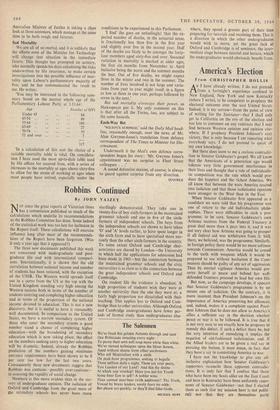Sad Mortality We are all of us mortal, and it
is unlikely that the efforts even of the Minister for Technology will change that situation in the immediate future. This thought has prompted an actuary, who normally spends his days calculating the risks underwritten by life insurance, to make certain investigations into the possible influence of mor- tality upon Labour's parliamentary majority of five, and he has communicated the result to me. He writes : `You may be interested in mary based on the nearest Parliamentary Labour Party Age Under 45 45-54 .. • • 55-64 .. • .
65-69 ..
70-74 ..
75 and over . • 'In a calculation of this sort the choice of a suitable mortality table' is vital. On considera- tion I have used the most up-to-date table used by life offices for assured lives, with a series of increases to the mortality at ages above sixty-five to allow for the strain of working at ages when most people have retired, especially under the
• •
the following sum- whole age of the at 1.11.64:
Number of MPs 84 89 100 27 10
7 317
• •
conditions to be experienced in this Parliament.
'I find' (he goes on unfeelingly) 'that the • ex- pected number of deaths, in the actuarial sense, is fractionally less than five in the first year and slightly over five in the second year. Half of the deaths are likely to be amongst the forty- four members aged sixty-five and over. Seasonal variation in mortality is marked at older ages, the first six 'months from November to April inclusive being the worst and the summer months the best. Out of five deaths, we might expect three in the winter and two in the summer. The number of lives involved is not large and varia- tions from year to year might result in a figure as low as three in one year, perhaps followed by seven in the next.'
But sad mortality o'ersways their power, as Shakespeare put it. My only comment on this is that after all the Tories, too, are subject to the same hazards.


































 Previous page
Previous page